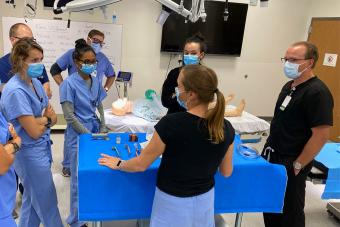By graduation from the program, the PA student is expected be at or near competency through obtaining, synthesizing, and integrating knowledge and skills. Foundational expectations of competency include an integration of all of the following:
- Demonstration of a depth and breadth of medical knowledge appropriate to deliver safe patient care
- Ability to obtain an organized history by asking appropriate, patient-centered, individualized questions that lead to the development of an accurate and appropriate assessment and plan
- Performance of a physical exam that, by using proper technique, allows the student to further develop the assessment and plan
- Ordering and interpreting labs, imaging, referrals, etc. that consider the individual patient and the risks, benefits, and costs
- Development of a reasonable differential diagnosis
- Reaching an appropriate assessment that is reflective of the evaluation of the patient that does not cause harm, neglect, or death
- Development of a treatment plan that reflects the individual patient’s needs and does not cause harm, neglect, or death
- Performance of clinical skills that is appropriate, effective, and within scope of practice
- Education of patients and their families on wellness, disease, prevention, and treatment plans and ensuring their understanding
- Documentation that is medicolegally truthful and sound and protects both the patient and the provider
- Timely performance of a patient visit that is reflective of a new PA graduate and workplace expectations (15-30 minute office visits as a reference)
- Professional behaviors and skills to include positive rapport, respectful communication, truthfulness, humility, self-reflection, implementation of constructive feedback, recognition of professional boundaries, organization, reliability, and accountability that allow the student to effectively demonstrate self-directed learning and ongoing quality improvement
- Interpersonal skills to include collegial communication, willing acceptance of constructive feedback, active listening, empathy, self-regulation, self-awareness
- Collegial collaboration with other members of the health care team that promotes interprofessional communication and positive patient outcomes
- Practices that protect professional licensure and prevention of disciplinary action such as prescribing practices and preferences and moral and ethical choices
- Approaching all patients with an attitude of respect, inclusivity, cultural humility, and empathetic, active listening
